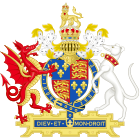Treasons Act 1534 facts for kids
| Act of Parliament | |

|
|
| Long title | An Act whereby divers Offenses be made High Treason; and taking away all Sanctuaries for all manner of High Treason. |
|---|---|
| Citation | 26 Hen. 8. c. 13 |
| Territorial extent | Kingdom of England |
| Other legislation | |
| Repealed by | Treason Act 1547 |
| Relates to | |
| Text of statute as originally enacted | |
The Treasons Act 1534 was an important law passed in 1534 in England. It was created during the time of King Henry VIII. This law made certain actions against the King or his new church rules a very serious crime called treason.
Contents
Why Was This Law Created?
This law came about right after another big change. In 1534, King Henry VIII passed the Act of Supremacy 1534. This Act declared that the King, not the Pope, was the "Only Head" of the Church of England. This was a huge shift in power.
What Was the Act of Supremacy?
The Act of Supremacy meant that King Henry VIII was in charge of the church in England. Before this, the Pope in Rome held that power. King Henry wanted to control religious matters in his own country. This change was a major part of the English Reformation.
What Did the Treasons Act Do?
The Treasons Act 1534 made it a crime punishable by death to disagree with the Act of Supremacy. If someone spoke or wrote against the King's new role as head of the church, they could be accused of treason.
Who Was Affected by This Law?
This law was meant to make sure everyone accepted the King's new rules. One famous person who was affected was Sir Thomas More. He was a respected scholar and former advisor to the King. Sir Thomas More refused to accept the Act of Supremacy. Because of this, he was found guilty under the Treasons Act and was executed.
What Else Did the Act Cover?
The Act also said it was treason if someone:
- Tried to harm the King, the Queen (Anne Boleyn), or their children.
- Tried to take away their royal power or titles.
- Said that the King was a "heretic" (someone with wrong religious beliefs), a "tyrant," or a "usurper" (someone who took power illegally).
The law also made it a crime to keep the King's castles, forts, ships, or weapons if he ordered them to be returned. It also removed the right to "sanctuary" for those accused of treason. Sanctuary was a place, often a church, where people could go to be safe from arrest.
When Did This Law End?
The Treasons Act 1534 was later cancelled. It was replaced by another law called the Treason Act 1547.
See also
- Treason Act 1551
- High treason in the United Kingdom
 | Victor J. Glover |
 | Yvonne Cagle |
 | Jeanette Epps |
 | Bernard A. Harris Jr. |

